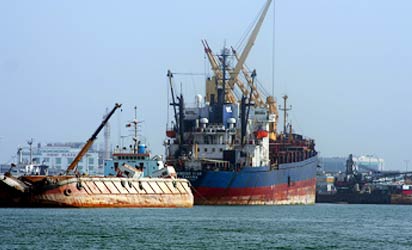
Sea-port
By Franklin Alli
THE Manufacturers Association of Nigeria (MAN) and the Nigerian Shippers’ Council (NSC) have expressed concern over sundry adverse ports regulatory environment calling for changes that could support business and economic development.
Speaking during a working visit to the Nigerian Shippers’ Council, the Director General of MAN, Mr. SegunAjayi-Kadir, said: “We cannot be operating in an environment that is not regulated. The nation could not have desired a better regulated port environment than now those businesses are expressing excruciating pains as a result of the biting recession.
‘The Federal Government’s economic recovery blue-print cannot be said to be holistic if the strategies of encouraging business growth through reduction in cost of doing business at the ports are not included.”
According to him, MAN observed that despite a series of complaints and engagements with the relevant government agencies and ministries, the terminal handling charges in Nigeria’s ports still remain relatively high when compared with neighbouring ports in West and Central African region.
MAN, he said, therefore, reminded the government that Nigeria’s ports are uncompetitive and cannot attract patronage, irrespective of how patriotic a business man wants to be.
Also speaking, one of the Council members of MAN, Chief John Aluya said: “We need a port economic regulator; otherwise the port will be in a mess. We applaud NSC for all its strides in the maritime industry and MAN will be willing to support you to ensure that we have a port regulated environment.
“MAN would like to be a part of the transport logistics plan in progress because when the cost of transportation is high the cost of product will be high. The Inland Container Depots (ICDs) will bring down the cost of doing business lower to our members. Equally, we applaud the Truck Transit Park (TTP) initiative with eight locations. We want to have them as soon as possible but we must emphasis that NSC needs a good legal framework to work better.”
Bar. Hassan Bello, the Executive Secretary and Chief Executive of NSC, stated that one of the Council’s goals is to reduce the cost of transportation and port charges through competition not by fixing prices, adding that Nigeria cannot attain the hub port status by fiat as there is competition among the ports in the West and Central African region.
“We cannot declare a hub status, we have to work and earn it. There is nothing like cargo diversion; it is a calculated decision. The cost of doing business in Nigeria’s port is still high and that explains why cargo owners route their cargoes to other competitive neigbouring ports around,” he said.
While ensuring that consumers of port services get competitive offerings, he said NSC would not take delight in seeing terminal operators and shipping companies operating at a loss because they have invested so much financially in the economy, adding: “NSC will not be seen as having done its works well when the terminal operators and shipping companies are not making profit”.
Bello explained that the Council is facilitating the establishment of numerous transport infrastructures in the country so as to help bridge the infrastructure deficit in the sector, as he further called on the government to fix the port access roads as an obligation to the port users.
Disclaimer
Comments expressed here do not reflect the opinions of Vanguard newspapers or any employee thereof.